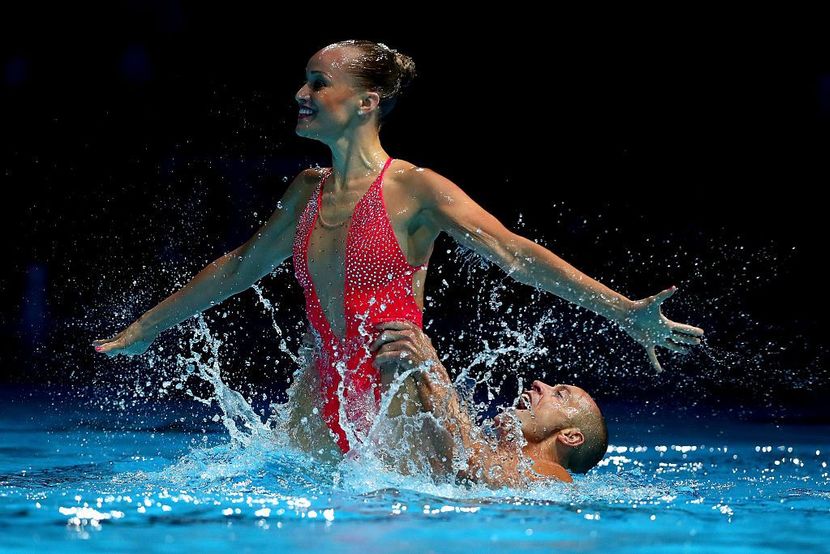
For the first time since 2015, when mixed duet events made their world championship debut in artistic swimming, American pioneer Bill May isn’t competing. Find out what he’s doing now.
In 2015, American Bill May was the first man to win a world championship gold medal in artistic swimming. He left Kazan, Russia with a silver as well. In 2017, he captured bronze in Budapest. In 2019, he returned to compete at age 40. On Monday, however – for the first time in mixed duet history at the world championships – the New York native wasn’t in the pool. Instead, May was the stadium announcer for the discipline they used to call “synchro.” After the mixed duet technical final, we caught up with the pioneer.
What exactly are your duties in Budapest?
I'm announcing for all of the artistic events, the greetings and scores. It’s a cool opportunity because I get a front seat to watch all the events.
This is the first time you’re not competing at the World Championships. How does it feel to be on the other side?
I have massive FOMO [Fear of Missing Out]! I want to be in the water. It’s hard but it's also nice because the routines are getting faster, more athletic, more dynamic. To be able to watch that evolution is amazing.
What have you noticed, specifically, about the evolution of mixed duet events?
Our sport isn't just about synchronization anymore. It's about lifts and partnering in these routines. And, you know, there needs to be diversity within our sport – and equality and equity. If you don't have men in the sport, the sport isn't going to grow in popularity, because people can't relate to something that excludes people. So in mixed duet, we're slowly adding people to the sport.
Have you noticed more acceptance of male artistic swimmers among crowds and parents?
Yes, acceptance of men in the sport is really growing. People see, even in the females, that it’s not just people in the water, trying to be pretty. These people are athletes, they're animals, and they're extremely dynamic. The athleticism surpasses SO many expectations.
There are a lot of mixed events in the Olympics now, like mixed relays, that nobody really trains for. But mixed duet is quite legit!
Oh yeah, and the male and female [partners] often have to train harder, because unlike a [same-sex] duet, the mixed duet athletes have to complement each other, rather than trying to look like the same person. Also, within each duet, a guy fires his muscles differently than a woman, their strength is different, their buoyancy is different, and, a lot of times, flexibility is different. Trying to make all of that complement each other is very difficult. It takes hours and hours and hours and hours of work.
Do you have any input on the future of the mixed event?
I'm actually up for the FINA Athletes’ Committee. [Results of voting will be announced on June 29]. If I do get that role, I hope to push more for [more inclusion]. We all want our sport to grow. We all want more people involved, more respect for the sport, and when you exclude people, you put a cap on it. One thing that we're pushing for the next World Championships in men’s solo events, and getting men involved in the team events and the highlight event. We want to be equal.
Are you still living in Las Vegas performing in Cirque du Soleil shows?
I moved from Las Vegas to become the head coach of the Santa Clara Aquamaids, my [long-time] club. Chris [Carver] stepped down but she's still my mentor, still there to help me, guide me. She's 80 years old and she's still amazing. I'm lucky to have her there to make the transition much smoother.
Any last words?
It sounds cliche, but the athletes here today are writing the history of our sport. From world championships to world championships, people get faster, stronger, higher, but to be part of [an emerging] event is something that can never be taken away from you. It will be with us for the rest of our lives. Now [mixed artistic swimming] just needs to be put into the Olympics. That's how it's really, really gonna grow. Often, you ask athletes how they got started and they'll say, I turned on the TV and I saw that star or that person who inspired me and I held on to that feeling all my life.”